北师大版(2019)必修 第三册Unit 9 Learning Lesson 3 The Secrets of Your Memory课件(共24张)
文档属性
| 名称 | 北师大版(2019)必修 第三册Unit 9 Learning Lesson 3 The Secrets of Your Memory课件(共24张) |
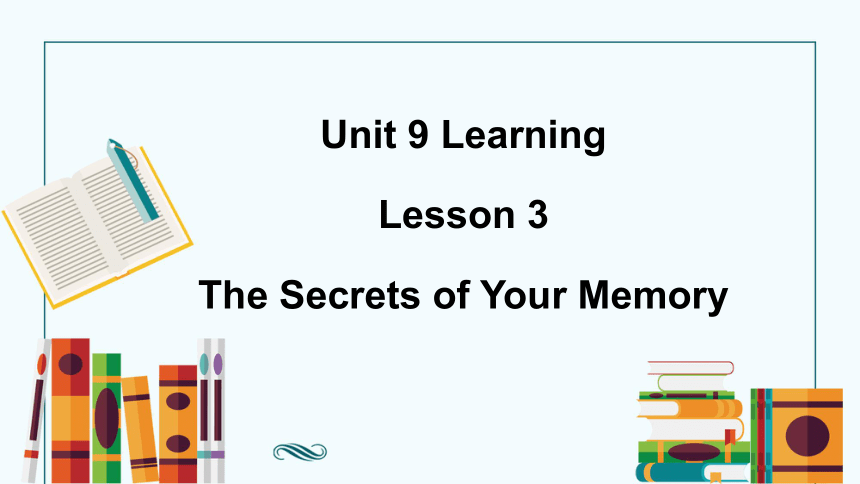
|
|
| 格式 | pptx | ||
| 文件大小 | 3.3MB | ||
| 资源类型 | 教案 | ||
| 版本资源 | 北师大版(2019) | ||
| 科目 | 英语 | ||
| 更新时间 | 2025-05-01 00:00:00 | ||
图片预览

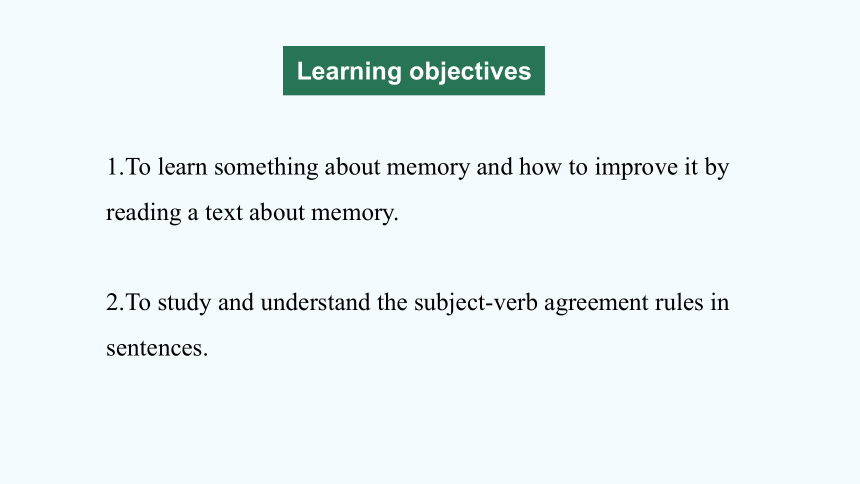
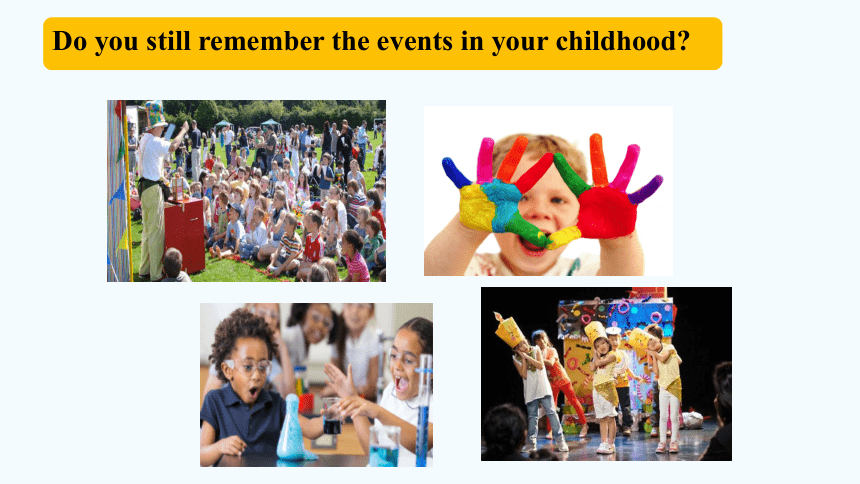
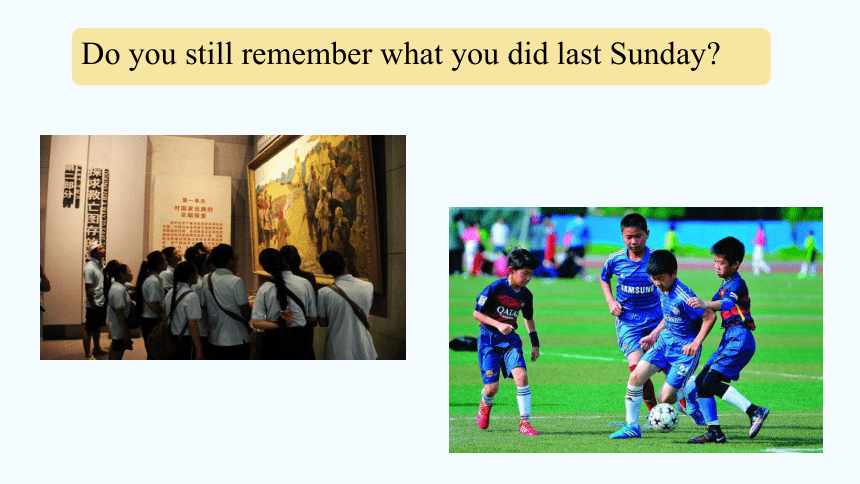
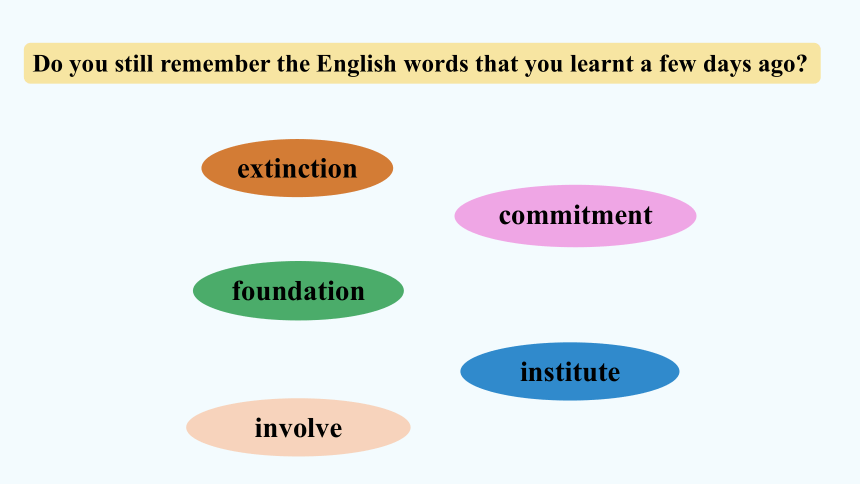
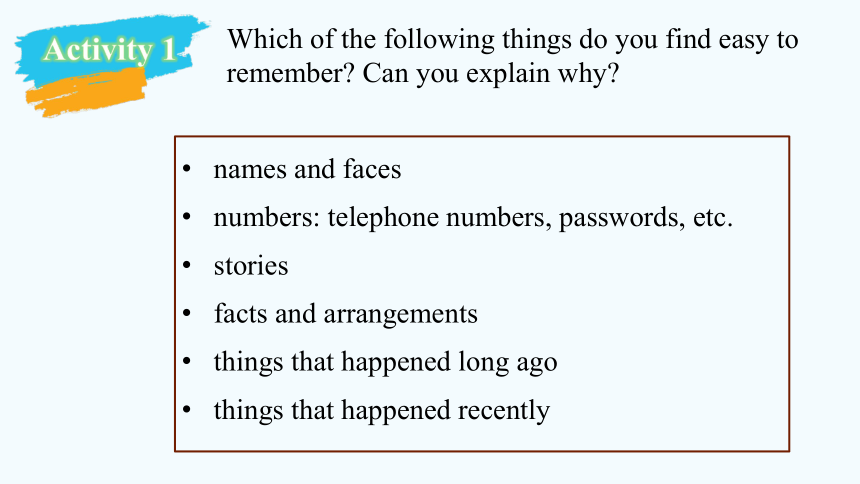
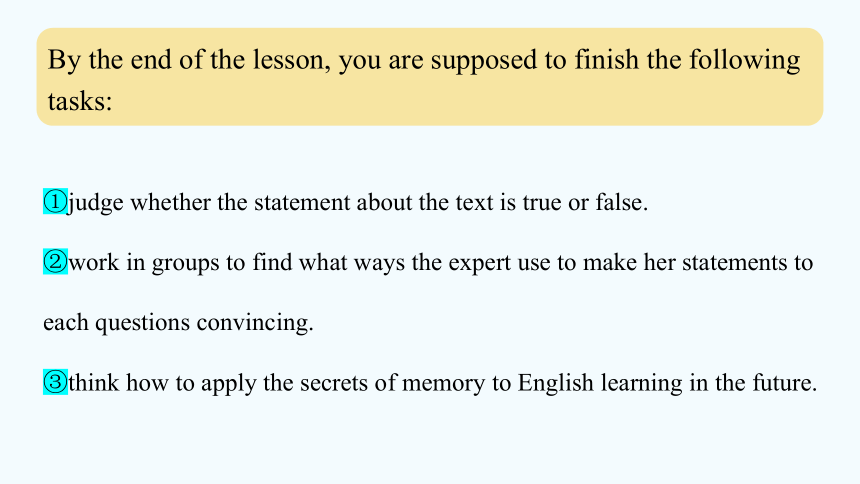
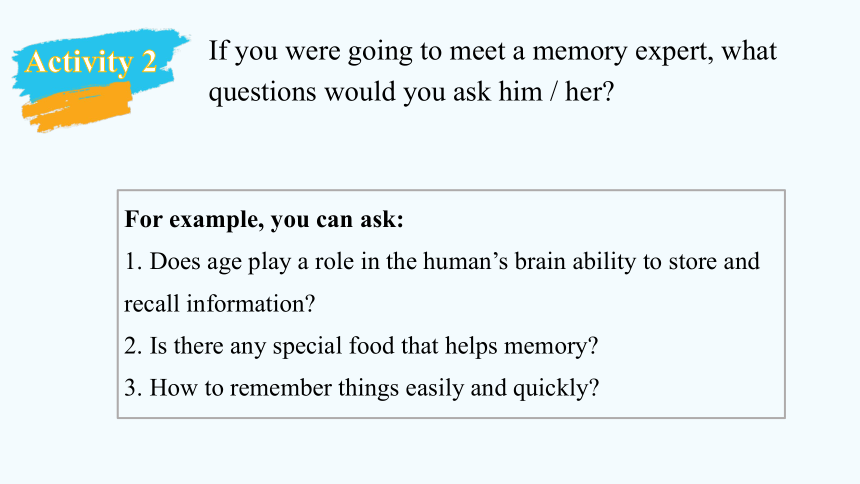
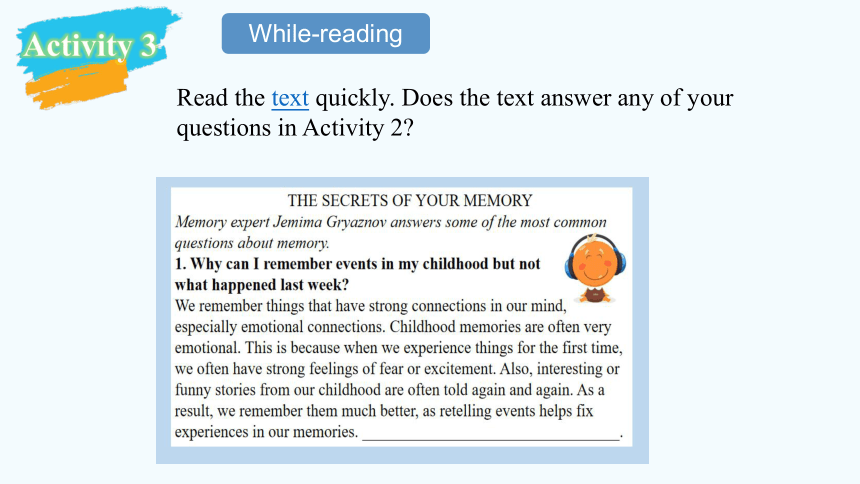
文档简介
(共25张PPT)
Unit 9 Learning
Lesson 3
The Secrets of Your Memory
1.To learn something about memory and how to improve it by reading a text about memory.
2.To study and understand the subject-verb agreement rules in sentences.
Learning objectives
Do you still remember the events in your childhood
Do you still remember what you did last Sunday
Do you still remember the English words that you learnt a few days ago
extinction
commitment
foundation
institute
involve
Which of the following things do you find easy to remember Can you explain why
names and faces
numbers: telephone numbers, passwords, etc.
stories
facts and arrangements
things that happened long ago
things that happened recently
Activity 1
By the end of the lesson, you are supposed to finish the following tasks:
①judge whether the statement about the text is true or false.
②work in groups to find what ways the expert use to make her statements to each questions convincing.
③think how to apply the secrets of memory to English learning in the future.
If you were going to meet a memory expert, what questions would you ask him / her
For example, you can ask:
1. Does age play a role in the human’s brain ability to store and recall information
2. Is there any special food that helps memory
3. How to remember things easily and quickly
Activity 2
Read the text quickly. Does the text answer any of your questions in Activity 2
While-reading
Activity 3
Read the text again. Write T or F. Corrected the false statements.
( ) 1. We remember certain events in our childhood, because we experienced many of them for the first time, and we felt strongly about them at the time.
( ) 2. When we tell a story many times, we forget important details.
( ) 3. Stephen Wiltshire has a photographic memory because he can draw a detailed picture of a city from memory after flying over it.
( ) 4. It has been proved that some people have a photographic memory.
( ) 5. The sharpest loss of memory occurs during the first five days.
( ) 6.Our memory starts to get worse in middle age.
T
F
F
F
F
F
we can remember them clearly
He is good at remembering particular things but does not have a photographic memory.
No one has been proved to have a photographic memory.
the very early period after learning
after the age of 25
Activity 4 Task1:
Pair work. What suggestions would you provide for each of the four questions discussed Discuss with your partner.
For example, you can discuss:
What do you do when you can’t remember something
What memory tricks do you suggest
How to remember new words effectively
After-reading
Activity 5
Match the following suggestions with the four questions and put them back in the pare your suggestions with the expert’s suggestions.
A. What can we learn from all this When remembering something new, try to connect it to our emotions. It is important to connect it with what we already know. Also, we can try to retell what we have learnt to a few others.
B. Therefore, one of the golden rules to increase how much we remember is to review the material periodically, especially during the first day after learning. This “spaced review” soon after learning helps build stronger memories and it is more effective than waiting to review everything before exams.
Para 2
Para 4
Activity 6
C. So take it easy. You are at a good age in terms of your memory. Make good use of it.
D. As most of us don’t have amazing memories like them, when memorising detailed learning materials, we simply need to focus on the important ideas and be curious about what we learn. Asking questions about what we learn also helps with memorisation. Another effective technique to remember things is to group similar ideas or information together so that they can be easily connected to things that are already known.
Para 1
Para 3
What truths about memory does Jemima Gryaznov discuss in the text
Truth 1 Truth 2 Truth 3 Truth 4
We remember things that have strong connections in our mind, especially emotional connections.
Nobody has a photographic memory.
The sharpest loss of memory occurs during the very early period after learning.
Our memory reaches its full power at the age of 25.
Activity 7
Activity 7
What advice does she give to improve one’s memory
Advice 1 Advice 2 Advice 3 Advice 4
We need to make strong connections with things we want to remember in our mind, especially emotional connections.
We need to focus on the important ideas and be curious about what we learn when memorising complex learning materials.
We need to review the information at regular intervals, especially in the first day after learning it.
We need to train our memory to remember more when we’re older.
Group work: Task2:
1. How has the expert tried to make her statements to each questions convincing What methods has she used and what signal words can you find
To make her statements convincing the expert used:
examples: For example...
figures: a famous forgetting curve
quote: According to...
numbers: 25,200,40
Activity 8
Group work. Task3.
How to apply the secrets of memory to English learning in the future
举例:
Activity 9
2. Are there any answers given by Jemima Gryazov that are not convincing to you What are your doubts
Underline the most and least convincing words in the text that Jemima Gryazov puts forward.
Discuss what methods she uses to convince others.
Replace the underlined words and phrase with the words from the text.
1. Jemima Gryaznov thinks people remember things that have strong sentimental attachment.
2. When we do things with enthusiasm, we tend to remember them well.
emotional
excitment
9
3. When we try to remember detailed material, we should focus on the important ideas.
4. Jemima Gryaznov suggested another effective method to remember things: grouping similar ideas or information togther.
5. A good strategy to increase memory is to review the material you are trying to remember often.
memorise
technique
periodically
Activity 8
Group Work: Think and share.
1) How has the expert tried to make her statements to each question convincing What methods has she used and what signal words can you find
2) Are there any answers given by Jemima Gryaznov that are not convincing to you What are your doubts
To make her statements convincing the expert used:
examples: For example …
figures: a famous forgetting curve
quote: According to …
numbers: 25, 200, 40
Activity 9
Replace the underlined words and phrases with the words from the text.
Jemima Gryaznov thinks people remember things that have strong sentimental attachment.
When we do things with enthusiasm, we tend to remember them well.
When we try to remember detailed materials, we should focus on the important ideas.
Jemima Gryaznov suggested another effective method to remember things: grouping similar ideas or information together.
A good strategy to increase memory is to review the material you are trying to remember often.
emotional
excitement
memorise
technique
periodically
Activity 10
Subject–Verb Agreement
Subject–verb agreement simply means the subject and verb must agree in number. This means both need to be singular or both need to be plural.
Examples:
The list of items is on the desk.
Breaking and entering is against the law.
Some of the apples are missing.
Circle the subject and then use the correct form of the verbs to complete the sentences.
1. Retelling events _________ (help) fix experiences in our memories.
2. There _________ (be) some people who do have amazing memories.
3. They _________ (be) both good at remembering particular things for a limited time.
4. One of the golden rules to increase how much we remember _________ (be) to review the material periodically.
helps
are
are
is
Activity 11
Group Work: Read the tips for improving your memory. Which tips seem most/least useful Which, if any, would be useful for English learning
Five Tips for Improving Your Memory
Sleep well: If you don’t sleep properly, you “lose” many of your memories.
Do physical exercise: When you exercise, more oxygen goes to your brain and makes your memory work better.
Do mental exercise: It is important to exercise your brain just like your body. New activities are more challenging than familiar ones.
Be interested: Ask yourself questions about what you are learning. We learn better if we are interested.
Form a mental picture: For example, if you want to remember the name “John Keys”, imagine his face with a big key on it. The stranger the picture, the better!
Unit 9 Learning
Lesson 3
The Secrets of Your Memory
1.To learn something about memory and how to improve it by reading a text about memory.
2.To study and understand the subject-verb agreement rules in sentences.
Learning objectives
Do you still remember the events in your childhood
Do you still remember what you did last Sunday
Do you still remember the English words that you learnt a few days ago
extinction
commitment
foundation
institute
involve
Which of the following things do you find easy to remember Can you explain why
names and faces
numbers: telephone numbers, passwords, etc.
stories
facts and arrangements
things that happened long ago
things that happened recently
Activity 1
By the end of the lesson, you are supposed to finish the following tasks:
①judge whether the statement about the text is true or false.
②work in groups to find what ways the expert use to make her statements to each questions convincing.
③think how to apply the secrets of memory to English learning in the future.
If you were going to meet a memory expert, what questions would you ask him / her
For example, you can ask:
1. Does age play a role in the human’s brain ability to store and recall information
2. Is there any special food that helps memory
3. How to remember things easily and quickly
Activity 2
Read the text quickly. Does the text answer any of your questions in Activity 2
While-reading
Activity 3
Read the text again. Write T or F. Corrected the false statements.
( ) 1. We remember certain events in our childhood, because we experienced many of them for the first time, and we felt strongly about them at the time.
( ) 2. When we tell a story many times, we forget important details.
( ) 3. Stephen Wiltshire has a photographic memory because he can draw a detailed picture of a city from memory after flying over it.
( ) 4. It has been proved that some people have a photographic memory.
( ) 5. The sharpest loss of memory occurs during the first five days.
( ) 6.Our memory starts to get worse in middle age.
T
F
F
F
F
F
we can remember them clearly
He is good at remembering particular things but does not have a photographic memory.
No one has been proved to have a photographic memory.
the very early period after learning
after the age of 25
Activity 4 Task1:
Pair work. What suggestions would you provide for each of the four questions discussed Discuss with your partner.
For example, you can discuss:
What do you do when you can’t remember something
What memory tricks do you suggest
How to remember new words effectively
After-reading
Activity 5
Match the following suggestions with the four questions and put them back in the pare your suggestions with the expert’s suggestions.
A. What can we learn from all this When remembering something new, try to connect it to our emotions. It is important to connect it with what we already know. Also, we can try to retell what we have learnt to a few others.
B. Therefore, one of the golden rules to increase how much we remember is to review the material periodically, especially during the first day after learning. This “spaced review” soon after learning helps build stronger memories and it is more effective than waiting to review everything before exams.
Para 2
Para 4
Activity 6
C. So take it easy. You are at a good age in terms of your memory. Make good use of it.
D. As most of us don’t have amazing memories like them, when memorising detailed learning materials, we simply need to focus on the important ideas and be curious about what we learn. Asking questions about what we learn also helps with memorisation. Another effective technique to remember things is to group similar ideas or information together so that they can be easily connected to things that are already known.
Para 1
Para 3
What truths about memory does Jemima Gryaznov discuss in the text
Truth 1 Truth 2 Truth 3 Truth 4
We remember things that have strong connections in our mind, especially emotional connections.
Nobody has a photographic memory.
The sharpest loss of memory occurs during the very early period after learning.
Our memory reaches its full power at the age of 25.
Activity 7
Activity 7
What advice does she give to improve one’s memory
Advice 1 Advice 2 Advice 3 Advice 4
We need to make strong connections with things we want to remember in our mind, especially emotional connections.
We need to focus on the important ideas and be curious about what we learn when memorising complex learning materials.
We need to review the information at regular intervals, especially in the first day after learning it.
We need to train our memory to remember more when we’re older.
Group work: Task2:
1. How has the expert tried to make her statements to each questions convincing What methods has she used and what signal words can you find
To make her statements convincing the expert used:
examples: For example...
figures: a famous forgetting curve
quote: According to...
numbers: 25,200,40
Activity 8
Group work. Task3.
How to apply the secrets of memory to English learning in the future
举例:
Activity 9
2. Are there any answers given by Jemima Gryazov that are not convincing to you What are your doubts
Underline the most and least convincing words in the text that Jemima Gryazov puts forward.
Discuss what methods she uses to convince others.
Replace the underlined words and phrase with the words from the text.
1. Jemima Gryaznov thinks people remember things that have strong sentimental attachment.
2. When we do things with enthusiasm, we tend to remember them well.
emotional
excitment
9
3. When we try to remember detailed material, we should focus on the important ideas.
4. Jemima Gryaznov suggested another effective method to remember things: grouping similar ideas or information togther.
5. A good strategy to increase memory is to review the material you are trying to remember often.
memorise
technique
periodically
Activity 8
Group Work: Think and share.
1) How has the expert tried to make her statements to each question convincing What methods has she used and what signal words can you find
2) Are there any answers given by Jemima Gryaznov that are not convincing to you What are your doubts
To make her statements convincing the expert used:
examples: For example …
figures: a famous forgetting curve
quote: According to …
numbers: 25, 200, 40
Activity 9
Replace the underlined words and phrases with the words from the text.
Jemima Gryaznov thinks people remember things that have strong sentimental attachment.
When we do things with enthusiasm, we tend to remember them well.
When we try to remember detailed materials, we should focus on the important ideas.
Jemima Gryaznov suggested another effective method to remember things: grouping similar ideas or information together.
A good strategy to increase memory is to review the material you are trying to remember often.
emotional
excitement
memorise
technique
periodically
Activity 10
Subject–Verb Agreement
Subject–verb agreement simply means the subject and verb must agree in number. This means both need to be singular or both need to be plural.
Examples:
The list of items is on the desk.
Breaking and entering is against the law.
Some of the apples are missing.
Circle the subject and then use the correct form of the verbs to complete the sentences.
1. Retelling events _________ (help) fix experiences in our memories.
2. There _________ (be) some people who do have amazing memories.
3. They _________ (be) both good at remembering particular things for a limited time.
4. One of the golden rules to increase how much we remember _________ (be) to review the material periodically.
helps
are
are
is
Activity 11
Group Work: Read the tips for improving your memory. Which tips seem most/least useful Which, if any, would be useful for English learning
Five Tips for Improving Your Memory
Sleep well: If you don’t sleep properly, you “lose” many of your memories.
Do physical exercise: When you exercise, more oxygen goes to your brain and makes your memory work better.
Do mental exercise: It is important to exercise your brain just like your body. New activities are more challenging than familiar ones.
Be interested: Ask yourself questions about what you are learning. We learn better if we are interested.
Form a mental picture: For example, if you want to remember the name “John Keys”, imagine his face with a big key on it. The stranger the picture, the better!
同课章节目录
- Unit 7 Art
- Lesson 1 Masterpieces
- Lesson 2 Beijing Opera
- Lesson 3 A Musical Genius
- Unit 8 Green living
- Lesson 1 Roots and Shoots
- Lesson 2 Greening the Desert
- Lesson 3 "White Bikes" on the Road
- Unit 9 Learning
- Lesson 1 Active Learning
- Lesson 2 Language Learning Tips
- Lesson 3 The Secrets of Your Memory
